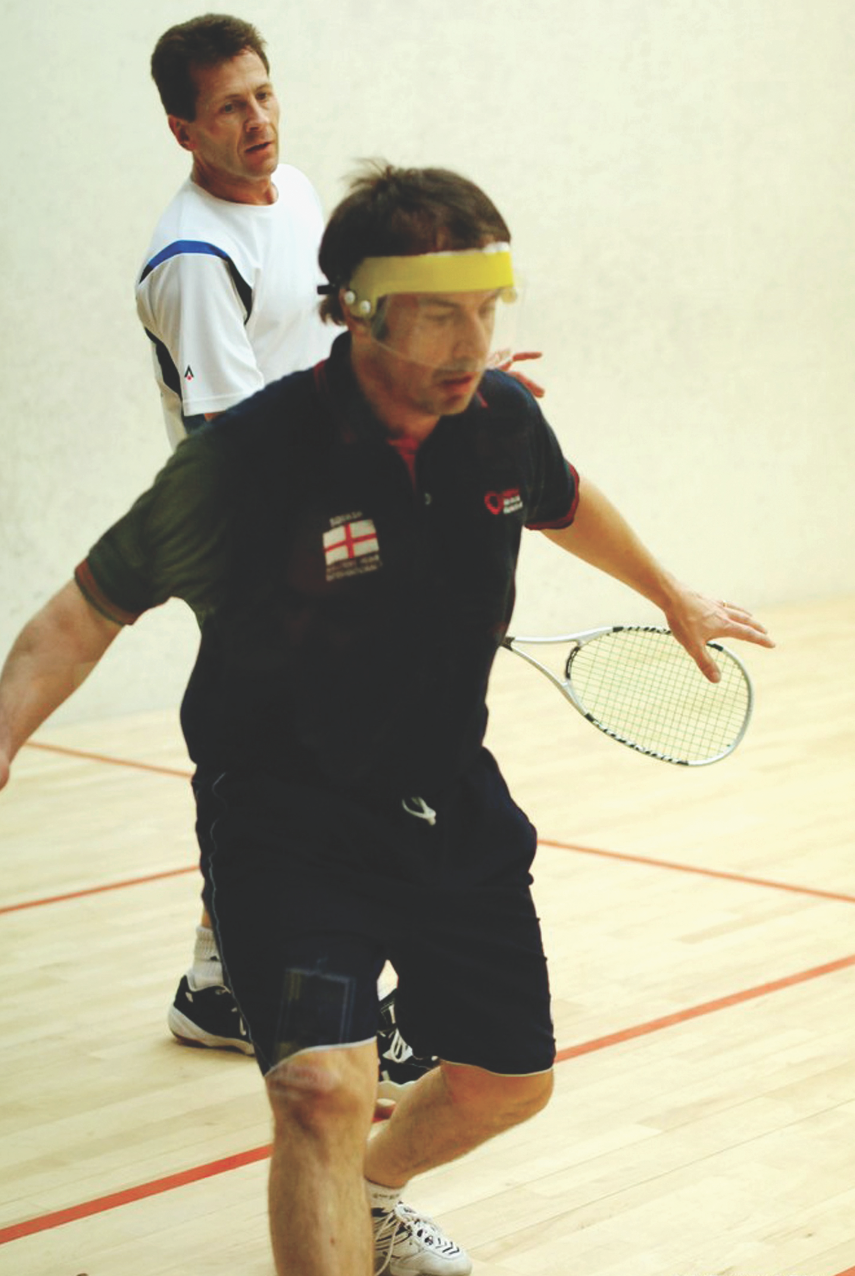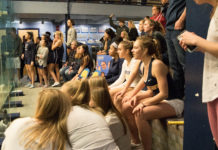By Richard Millman, Director of Squash, Kiawah Island Club
When promoting the game of Squash, those of us that propound it as a wonderful past-time often speak of the beneficial life-lessons that are learned while participating in our sport.
What are those valuable lessons? Clearly they are many and varied and not the same for each of us. But simply saying that one learns many valuable life-lessons in squash doesn’t illustrate to a person who is new to the sport, what kind of lessons may be learned.
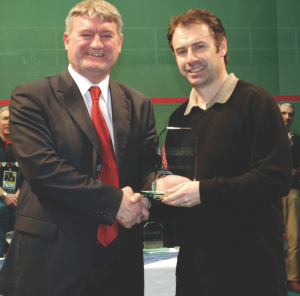
This month, at the risk of being overly personal, I have decided to offer an auto-biographical piece. As many readers may know, each time I play a competition I write a blog-style report about my matches. I started this a few years ago and after I received many requests from new readers to be included in the distribution list, I enquired as to what my readers were enjoying in these articles.
I received some very pleasant compliments about my writing, but what came through more than anything else was that readers were enjoying the accounts of my thought processes and reasoning as I dealt with the various pressures and situations that occur under competitive conditions.
While my particular lessons learned will likely be very different to those that you yourself have learned in the sport, I hope that this article may provide similarly helpful illumination.
I hope this exercise either helps you, your students, your friends or your promotion of our sport in some measure.
Please accept my apologies if it is a little too personal.
When I started playing Squash at Gresham’s School in Norfolk, England, in 1970, I had no idea what I was getting involved with. Of course, I was 12 and so I didn’t understand very much anyway.
My team was coached by a man called Malcolm Willstrop, who has become well known in later years as the coach of Lee Beechill and now particularly of his son James Willstrop—one of the finest exponents of the game of the modern era.
I was never a strong player by comparison with my teammates whilst at school. Indeed I never played above the fifth spot (on a team of five) between the ages of 12 and 18. Each of the other team members became ranked number one in England at some point in their junior careers (they were all different ages) with the exception of two—Sau Meng Chan who was from Malaysia and Nick Wall who was still very highly ranked in English Junior rankings (The others were: Gawain Briars, later World No. 4; Richard LeLievre, British Junior Champion and England; Christy Willstrop, English Junior No. 1 and England; John Cordeaux, English Junior No. 1 ranked player and England).
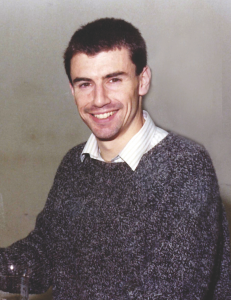 So I had to learn patience. If you find yourself knocking your head against a brick wall in the form of players who are better than you, you either give up or you hang on with them and get going. And squash players never give up.
So I had to learn patience. If you find yourself knocking your head against a brick wall in the form of players who are better than you, you either give up or you hang on with them and get going. And squash players never give up.
I discovered that I had one asset that was at a premium. That of physical and mental determination. Not that it was immediately obvious. It took a while for me to have the courage to put my maximum effort in. For a long while I wouldn’t give 100% because I thought it would be embarrassing to give everything and fail. But then I discovered that if I put 100% in I might fail, but if I didn’t put 100% I definitely would fail.
When I tried to the max, I also made progress. Tiny little stepping stones, but progress nevertheless. I also received the appreciation of my teammates, who recognized my efforts. Suddenly my self confidence started to increase, because, although I wasn’t dramatically successful, as I reviewed my performances, I could see tangible improvement.
Finally this all came to fruition when I was made captain of the Norfolk Junior Under 19 team (still playing number 5) and we went on to win the National Junior Inter-county Championships. We played against Yorkshire, the top team in the nation, and as the match progressed, I found myself going on the court with the result in the balance as the match stood at two matches all. My opponent was a fine player and I lost the first two games. I will never forget seeing the pleading expressions of my teammates, as they hung over the balcony, willing me to dig deep and find something extra. I did. I won in the fifth and the team won 3-2. The only team in Norfolk squash history at any level, to win a National county championships (to date at the time of writing).
So I learned to never give up. That self-less effort gives one a tremendous feeling of reward and the appreciation of one’s fellow man.
That playing for a team, makes playing for one’s self, easier.
I left high school at age 18 expecting (for no particular reason) to go to University. I thought I would like to study English Literature. I applied to three Universities and was accepted at none of them. I was invited to attend several other Universities and didn’t want to go to any of them.
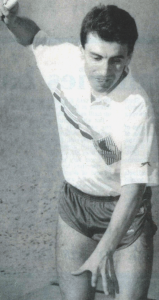 So, finding myself in limbo, I accepted an offer to become a trainee manager at a local commercial squash club, called the Hunter Club, in Norwich.
So, finding myself in limbo, I accepted an offer to become a trainee manager at a local commercial squash club, called the Hunter Club, in Norwich.
Pretty soon I was busy coaching. I had done a little coaching at school with some of the younger players and enjoyed it. However, after a little while I started to realize that I was passing on information without question. How, I asked myself, can I ask people to trust what I was saying purely on my say so. So I started to question myself. Did I really believe that what I was saying was accurate? And pretty soon I realized that the answer was—No!
So I decided that unless I could prove something to my own satisfaction, that I wouldn’t pass it on. After all, if my students didn’t fully understand what I was asking them to do, how would they perform with any confidence in the heat of battle?
As a result I learned to question (with humility) much of what I had hitherto taken as gospel. Pretty soon I realized that a lot of the accepted squash lore just didn’t make sense. I decided if an idea wasn’t logical, I shouldn’t propound it.
My students started to get better—a lot better. And another thing happened. My squash got better. Having never been nationally ranked as a junior squash player, I suddenly found myself in contention in the senior ranks—a much bigger pool.
So I learned to question and I learned to reason. Logic is taught at college. What a pity we weren’t encouraged to politely question received wisdom in a more curious way at school.
As my coaching reputation developed, so did my game. I found myself competing successfully against those that I had previously always lost to. The marriage of the thought provoking coaching and the reasoned approach to playing, in addition to the patience born of the desire to never give up, had resulted in a form of stamina.
Initially this was a reactive stamina. I simply responded by hanging on. But gradually I started to get fed up with just hanging on and I wondered what I could do in the future.
Chasing is reactive behavior. No matter what great shape you are in (intellectually or physiologically), the best you can do by chasing is to very nearly catch up. In other words you are still in second (or frequently last) place.
I was teaching my students how to think ahead and now (finally) it dawned on me that the same principle would work well for my own game.
At school I had developed a reputation for being the hardest trainer. In his last year at school Gawain Briars (then English Junior number one and later British number one and world number 4) was quoted in the school yearbook as saying ‘Gawain Briars would like to thank Richard Millman for training him this year.’ Reacting to my coach’s fairly domineering methods, I had become Mr. Fit and even was selected to run for my county at the National cross country championships.

Those comments from Gawain gave me tremendous psychological confidence. But they came as a result of achievement. If we want to build our self confidence, there is no substitute for achievement. It doesn’t have to be a big thing. Just a gradual building up of little achievements, until finally, upon review, the sum of the little results in a mountain of which we can be justly proud. Just make a start, be consistent and time will do the rest.
Now as a young adult I started to realize that if I prepared well, my performances would reflect that preparation. Perhaps obvious, but if I hadn’t gone through the development that Squash gave me, I might have understood that intellectually, but I would never have felt it tangibly in the way that the game taught me.
I now developed a reputation for off and on-court training. It became something of a spectator sport, people would come and watch me train. Local rivals would enquire as to what training I was doing. Preparation resulted in a reputation. I derived both actual on court benefits and psychological benefits.
Jump forward 25 years. In February, I played in the British National Championships. In both the semifinal and final matches I warmed up for over an hour. Both of those matches lasted under thirty minutes. The preparation was the performance. How often is that true in life. The preparation is the performance. (Ed. Note: Millman won the British M50; visit www.EnglandSquashMasters.com for more).
As I went through my twenties, I had some anger issues. When I couldn’t produce the result that I had predetermined that I was capable of, I would look for somewhere to apportion blame. It took me a long time to realize that if I didn’t artificially load myself with performance expectations that no-one other than me had demanded, then I didn’t have to carry an unnecessary burden.
This was a very difficult period for those around me that cared for me and I hurt a lot of people in my confused and muddled anger.
When finally I started to be more interested in how far I had come rather than suggesting to anyone that would listen that I was capable of being more than I was, I began to see progress. The simple action of reviewing actual progress and evaluating what had got me there, honing those behaviors and preparing as well as I possibly could, gave me the best chance of producing an optimum performance. Without the specter of an overly optimistic predicted performance to haunt me, I was able to enjoy my performances and see them as progress rather than failures.
This can be a real problem for teams where the coach sets artificially optimistic goals and only praises results not performance. The players never actually feel that success is a gain. If they do reach the goal, all they feel is relief that they have avoided failure, rather than the exhilaration of achievement. This is not to be confused with setting artificially low expectations which the socialist conventions of the late eighties, nineties and two thousands promoted to avoid any kind of competition. Goal setting must be focused on performance not outcome, effort and not accolades.
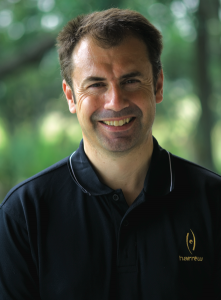 It took me a long time to realize that it was perfectly fine to be just ordinary everyday me—a work in progress, rather than having to be me-extra, me-plus—a pedestal that was always beyond reach. By looking at the milestones we pass as we go by them, it enables us to strive toward future milestones with renewed vigor and without fearing whether or not we will attain them. Our efforts will bring us the rewards we deserve. No one can know what those rewards are without working to get them, so longing for the outcome is wasteful. Life is a journey of discovery and the actual rewards are often satisfactorily different to and more wonderful than those that we think we are setting out to attain.
It took me a long time to realize that it was perfectly fine to be just ordinary everyday me—a work in progress, rather than having to be me-extra, me-plus—a pedestal that was always beyond reach. By looking at the milestones we pass as we go by them, it enables us to strive toward future milestones with renewed vigor and without fearing whether or not we will attain them. Our efforts will bring us the rewards we deserve. No one can know what those rewards are without working to get them, so longing for the outcome is wasteful. Life is a journey of discovery and the actual rewards are often satisfactorily different to and more wonderful than those that we think we are setting out to attain.
Not to try and be too twee about it but our journey on the squash court can be reasonably reflective of our life journey.
In that confined space where we compete at close quarters with other human beings there are many lessons to be learned.
We have the opportunity to learn honesty, humility, inventiveness, the development of self-esteem and confidence, how to earn the admiration of our peers, persistence, determination, emotional control, courage, style, deception, survival skills, organization and planning, sensitivity—physical, mental and emotional.
There is of course even more than this and I hope that you will continue to explore alone and with friends and students.
Long may our voyage of discovery continue and long may we continue to learn the lessons. I look forward to your company as we travel.


